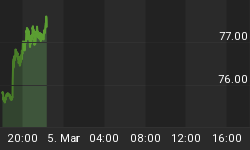There seems to be much confusion lately about the consumer's increased savings rate and if this is a good or bad condition for the health of the U.S. economy. While many Austrian economists are lauding our new found predilection to save, the Administration is obsessing over forcing banks to increase lending and compelling consumers to step up their borrowing.
It is factually correct to believe the U.S. consumer must embark on a protracted period of savings and reduced consumption in order to reconcile the decades of imbalances encouraged by the Fed and banking system. Unfortunately, the very idea of a newly-frugal consumer is a complete farce.
According to the Bureau of Economic Research, Americans saved 1.8% of their disposable income in 2008. That equates to a total savings of $191.4 billion. And in another seemingly encouraging sign, consumers saved at an annual rate of 4.4% in January and at a 4.2% annual rate in February 2009. At the current pace, consumers would save $464.4 billion in this year. This has caused some economists to take heart that the excess consumption patterns of the past few decades have begun to reverse.
However, the problem is that at the same time our government is busy ensuring that any private sector saving is more than offset by increased public debt. In 2008, the budget deficit was a then-record $438 billion. This year the budget deficit is projected by the Congressional Budget Office to be $1.8 trillion -- a four-fold increase!
Thus, as a nation we have not saved a nickel. What most economists overlook is that all public debt is a direct obligation upon the consumer, meaning taxpayers -- a much smaller universe than consumers, mind you -- saw their debt burden increase by $246.6 billion last year and will watch it skyrocket by a projected $1,335.6 billion this year alone!
What makes today's policy course such a travesty is that our government is creating this record-shattering debt in order to increase bank lending and to specifically reverse the positive recent trend in consumer savings. Thus, the Obama Administration is seamlessly taking the baton from the Bushies and is even more aggressively seeking to borrow our way out of debt and print our way back to prosperity.
As long as savings is viewed as the problem and consumption is viewed as the solution, there we will be no escaping our economic malaise. Consumers may have finally begun to repent for their profligate ways, but as long as government annuls that effort we will still face all the ravaging effects from onerous debt.
Our nation's debt now stands at over $11 trillion, with CBOE estimates suggesting it will grow by another $9.3 trillion over the next ten years. That is the perfect condition to engender yet higher rates of unemployment, along with increasing tax and interest rates.
After the short-term euphoria wears off from the Obama stimulus packages, we'll be left to discover that we've not only squandered even more current and future savings, but that we have cooked up the perfect recipe for stagflation.
Be sure to listen in on my Mid-Week Reality Check.















